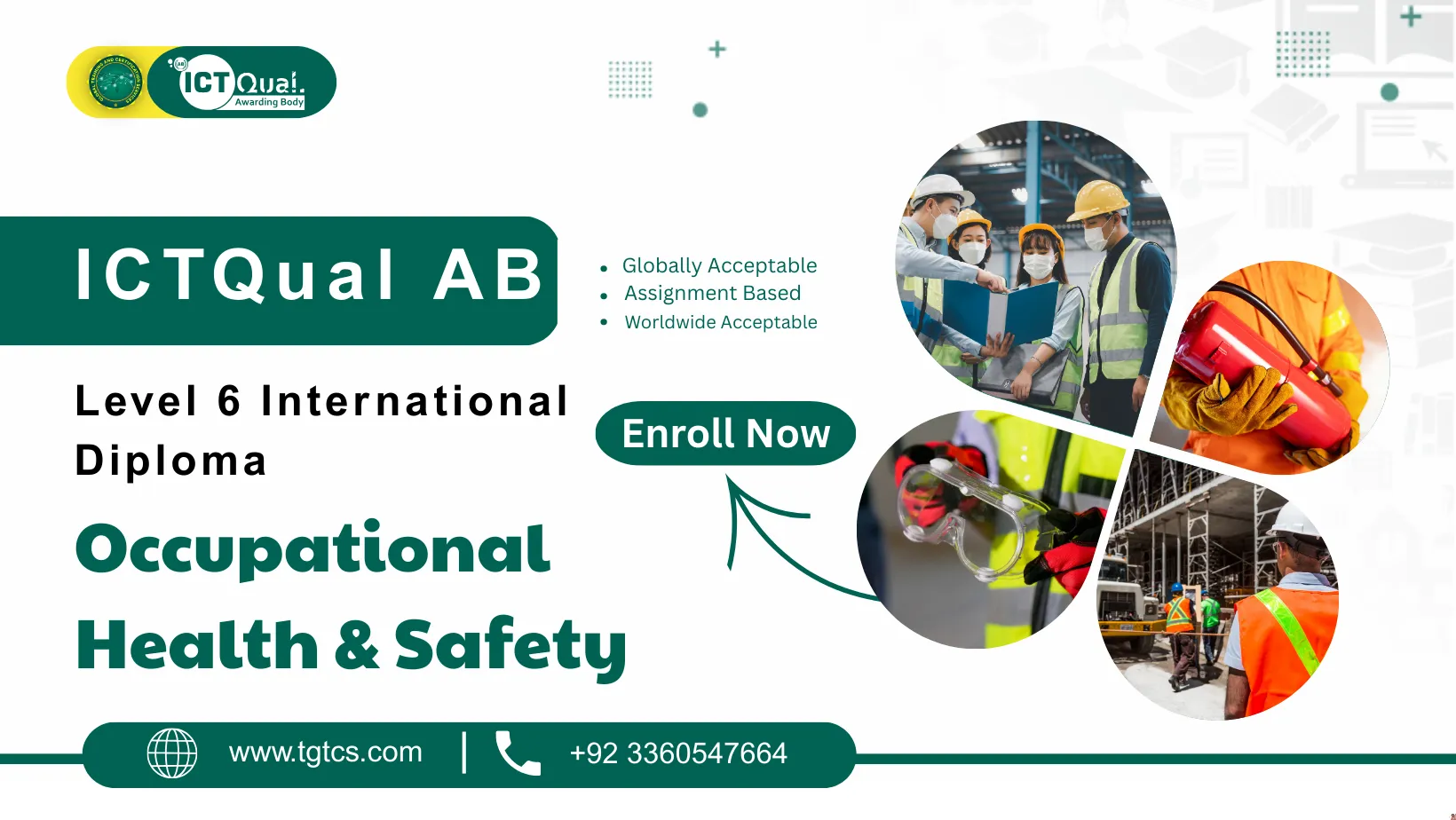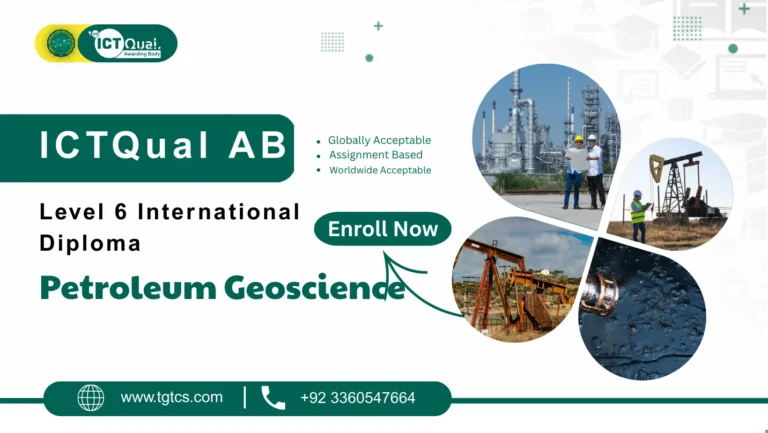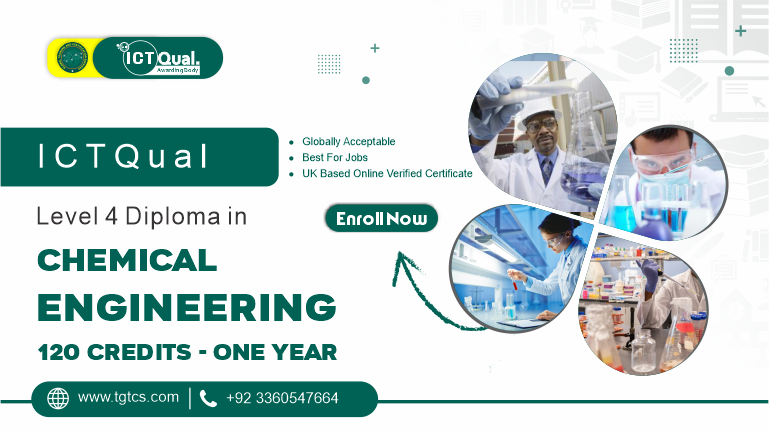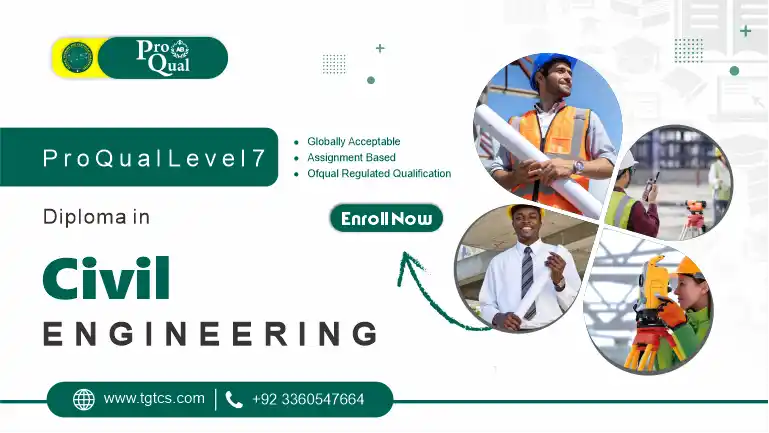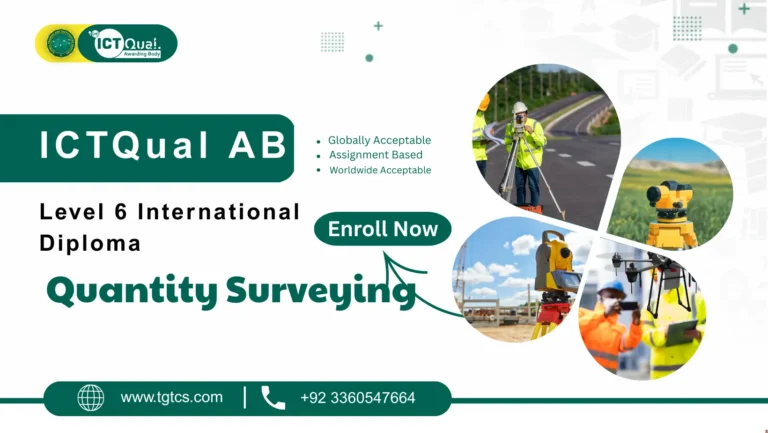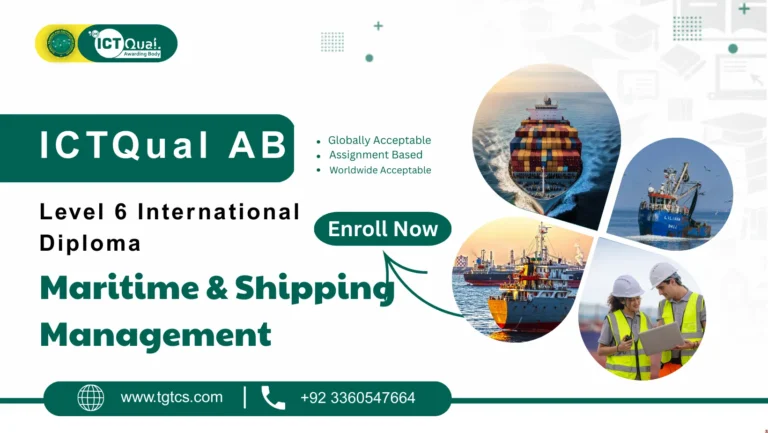ICTQual AB Level 6 International Diploma in Occupational Health & Safety (OHS)
Occupational Health and Safety (OHS) has become a critical priority in today’s industries, where ensuring the well-being of workers and compliance with international safety standards directly impacts productivity, sustainability, and organizational success. The ICTQual AB Level 6 International Diploma in Occupational Health & Safety (OHS) is designed to provide learners with advanced knowledge, practical skills, and strategic expertise required to manage health and safety systems in diverse professional environments.
This globally recognized diploma equips learners with a strong foundation in workplace safety, risk assessment, accident prevention, hazard control, and safety management systems. It goes beyond basic compliance, focusing on developing safety leaders who can design, implement, and audit OHS programs aligned with global standards such as ISO 45001, OSHA, and NEBOSH frameworks.
The purpose of this qualification is to prepare professionals who can anticipate and mitigate occupational hazards across industries including oil and gas, construction, manufacturing, healthcare, and energy sectors. Learners will gain expertise in emergency preparedness, safety audits, incident investigation, and creating a culture of safety in organizations.
Through this program, participants will not only strengthen their technical capabilities but also enhance their leadership, communication, and decision-making skills to take on senior safety management roles. With its flexible, assignment-based structure, the diploma is suitable for both fresh learners aspiring to enter the OHS field and experienced safety professionals aiming to validate and upgrade their competencies.
The Global Training and Certification Services is Approved Training Centre of ICTQual AB UK Ltd
Course Level and Credits
Level 6 International Diploma, 360 credits.
Suitable for professionals, safety officers, managers, and students seeking advanced knowledge in occupational health, safety, and risk management.
Mode of Study
Fully assignment-based; learn at your own pace.
Accessible from anywhere in the world, flexible for working professionals and career changers.
Global Recognition & Attestation
British Council verifiable, MOFA and Embassy attested.
Recognized for career advancement, employment, and iqama approval in Gulf countries.
Scope and Purpose
Comprehensive coverage of occupational health, workplace safety, hazard management, and compliance standards.
Focus on both theoretical understanding and practical application in real-world industrial, construction, and corporate environments.
Skills and Knowledge Gained
Occupational risk assessment, hazard identification, and safety program implementation.
Leadership and strategic decision-making skills for managing workplace health and safety teams.
Emergency preparedness, incident investigation, and regulatory compliance knowledge.
Career Benefits
Opens opportunities in multinational companies, construction, oil & gas, healthcare, and industrial sectors.
Enhances professional credibility, employability, and eligibility for iqama approval in Gulf countries.
Target Audience
Safety officers, occupational health professionals, managers, engineers, and students aiming for careers in health and safety management.
Unique Selling Points (USPs)
Flexible self-paced study, fully assignment-based.
Prestigious and globally recognized Level 6 diploma.
Suitable for fresh learners and experienced professionals with prior work experience.
Mandatory Unit
This qualification, the ICTQual AB Level 6 International Diploma in Occupational Health & Safety (OHS), consists of 36 mandatory units.
Year 1 – Foundation of Occupational Health & Safety (OHS)
- Principles of Occupational Health & Safety Management
- International Health & Safety Legislation and Compliance
- Risk Assessment and Hazard Identification
- Accident Investigation and Incident Reporting
- Fire Safety and Emergency Preparedness
- Environmental Health & Safety (EHS) Fundamentals
- Workplace Ergonomics and Human Factors
- Safety Culture and Behavioural Safety
- Occupational Health and Industrial Hygiene
- Personal Protective Equipment (PPE) Management
- Workplace Safety Auditing and Monitoring
- Communication and Training in Health & Safety
Year 2 – Applied Occupational Health & Safety (OHS)
- Advanced Risk Management and Control Strategies
- Safety Leadership and Organizational Culture
- International Standards and ISO 45001 Implementation
- Construction and High-Risk Industry Safety
- Process Safety and Chemical Hazard Management
- Occupational Disease Prevention and Control
- Crisis and Disaster Management in the Workplace
- Transportation and Logistics Safety Management
- Contractor and Supply Chain Safety Oversight
- Sustainability and Corporate Responsibility in OHS
- Research Methods in Occupational Health & Safety
- Final Project / Professional Practice in OHS
Year 3 – Professional Competence and Specialized OHS Practice
- Strategic OHS Management and Policy Development
- Advanced Workplace Health Promotion and Well-being
- Safety Technology, Digital Tools, and Data Analytics
- Global Perspectives in Occupational Health & Safety
- Corporate Governance and Ethical Responsibilities in OHS
- Industrial Safety in Oil, Gas, and Energy Sectors
- Safety in Healthcare and Public Service Environments
- Emerging Risks and Future Trends in Workplace Safety
- Training Design and Development for OHS Professionals
- Independent Research Project in Occupational Health & Safety
- Professional Practice, Portfolio, and Competence Review
- Final Capstone Project / Dissertation
The ICTQual AB Level 6 International Diploma in Occupational Health & Safety (OHS) equips learners with comprehensive knowledge, practical skills, and strategic expertise to excel in health and safety management across industries globally.
Year 1 – Foundation of Occupational Health & Safety (OHS)
Principles of Occupational Health & Safety Management
- Understand core concepts and principles of occupational health and safety.
- Develop foundational skills to manage workplace safety programs effectively.
- Recognize roles and responsibilities of OHS professionals.
- Apply safety management techniques to everyday work environments.
International Health & Safety Legislation and Compliance
- Understand global occupational health and safety legislation.
- Apply compliance requirements to workplace operations.
- Evaluate legal obligations in different industries and regions.
- Integrate OHS standards into organizational policies and practices.
Risk Assessment and Hazard Identification
- Conduct comprehensive risk assessments for workplace hazards.
- Identify physical, chemical, biological, and ergonomic risks.
- Prioritize hazards and implement effective control measures.
- Apply risk management frameworks to prevent workplace incidents.
Accident Investigation and Incident Reporting
- Investigate workplace accidents using systematic methods.
- Prepare accurate and detailed incident reports.
- Identify root causes and recommend preventive measures.
- Develop strategies to reduce recurrence of incidents.
Fire Safety and Emergency Preparedness
- Understand fire hazards and prevention techniques.
- Implement emergency response plans effectively.
- Conduct fire drills and training for personnel.
- Evaluate fire safety equipment and procedures for compliance.
Environmental Health & Safety (EHS) Fundamentals
- Understand EHS principles and sustainable practices.
- Evaluate environmental impacts of workplace operations.
- Implement environmental monitoring and control measures.
- Integrate EHS policies into organizational safety management.
Workplace Ergonomics and Human Factors
- Apply ergonomic principles to improve workplace design and productivity.
- Identify human factors affecting safety and performance.
- Recommend interventions to reduce work-related injuries.
- Promote employee well-being through ergonomic strategies.
Safety Culture and Behavioural Safety
- Assess organizational safety culture and employee behavior.
- Implement strategies to enhance safety engagement and awareness.
- Encourage proactive safety behavior and accountability.
- Develop programs to sustain long-term safety culture improvements.
Occupational Health and Industrial Hygiene
- Understand occupational health hazards and exposure limits.
- Monitor workplace air quality, noise, and chemical exposure.
- Apply industrial hygiene techniques to prevent illness.
- Develop health surveillance and monitoring programs.
Personal Protective Equipment (PPE) Management
- Select appropriate PPE for various workplace hazards.
- Train employees on correct PPE usage and maintenance.
- Implement PPE compliance audits and monitoring.
- Evaluate PPE effectiveness and recommend improvements.
Workplace Safety Auditing and Monitoring
- Conduct systematic workplace safety audits.
- Identify non-compliance and improvement areas.
- Develop corrective action plans based on audit findings.
- Monitor safety performance using key indicators.
Communication and Training in Health & Safety
- Develop effective safety communication strategies.
- Deliver OHS training programs for diverse workforces.
- Promote safety awareness through campaigns and workshops.
- Evaluate training effectiveness and continuous improvement.
Year 2 – Applied Occupational Health & Safety (OHS)
Advanced Risk Management and Control Strategies
- Implement advanced risk control measures for complex hazards.
- Use quantitative and qualitative risk assessment methods.
- Develop mitigation strategies for high-risk industries.
- Monitor effectiveness of risk management programs.
Safety Leadership and Organizational Culture
- Lead OHS initiatives and influence organizational safety culture.
- Promote proactive safety management across teams.
- Integrate leadership principles in health and safety practices.
- Evaluate organizational performance and employee engagement in safety.
International Standards and ISO 45001 Implementation
- Apply ISO 45001 requirements to workplace safety systems.
- Implement occupational health and safety management systems.
- Conduct audits for compliance with international standards.
- Continuously improve safety management systems.
Construction and High-Risk Industry Safety
- Identify hazards specific to construction and high-risk industries.
- Implement safety controls for equipment, machinery, and processes.
- Develop emergency response and contingency plans.
- Ensure regulatory compliance in dynamic work environments.
Process Safety and Chemical Hazard Management
- Manage chemical hazards and process safety risks effectively.
- Conduct hazard analyses for industrial processes.
- Develop preventive and emergency response procedures.
- Monitor chemical handling, storage, and disposal practices.
Occupational Disease Prevention and Control
- Identify occupational diseases and exposure risks.
- Implement health surveillance and preventive measures.
- Educate workforce on disease prevention strategies.
- Integrate occupational health management into organizational policies.
Crisis and Disaster Management in the Workplace
- Develop workplace emergency and disaster response plans.
- Conduct risk assessments for potential crises.
- Train teams in crisis communication and response.
- Evaluate disaster management performance and improvements.
Transportation and Logistics Safety Management
- Identify hazards in transport and supply chain operations.
- Implement safety protocols for logistics and vehicle operations.
- Monitor compliance with transportation safety standards.
- Integrate safety strategies into logistics planning.
Contractor and Supply Chain Safety Oversight
- Ensure contractor adherence to OHS standards.
- Monitor supply chain safety performance.
- Develop contractor safety programs and audits.
- Promote collaborative safety practices across organizations.
Sustainability and Corporate Responsibility in OHS
- Integrate sustainability into workplace safety programs.
- Evaluate environmental and social impacts of OHS policies.
- Promote responsible and ethical safety management.
- Develop strategies for long-term organizational resilience.
Research Methods in Occupational Health & Safety
- Apply research methodologies to investigate safety issues.
- Collect and analyze data to improve safety practices.
- Develop evidence-based safety recommendations.
- Conduct applied research projects in workplace safety.
Final Project / Professional Practice in OHS
- Apply theoretical knowledge to real-world OHS projects.
- Demonstrate competence in managing complex safety challenges.
- Produce professional reports and presentations on safety initiatives.
- Showcase leadership and problem-solving skills in practice.
Year 3 – Professional Competence and Specialized OHS Practice
Strategic OHS Management and Policy Development
- Develop organizational safety policies and strategic plans.
- Implement risk-based management approaches.
- Align OHS strategies with corporate objectives.
- Evaluate effectiveness of safety policies at organizational level.
Advanced Workplace Health Promotion and Well-being
- Design programs to promote workforce health and well-being.
- Integrate wellness initiatives with OHS policies.
- Evaluate outcomes of health promotion programs.
- Support mental health and occupational well-being strategies.
Safety Technology, Digital Tools, and Data Analytics
- Apply digital solutions and analytics for workplace safety.
- Use software and sensors to monitor hazards.
- Implement technology-driven risk management systems.
- Evaluate efficiency and performance using safety data metrics.
Global Perspectives in Occupational Health & Safety
- Understand international best practices and standards.
- Apply global safety strategies in local contexts.
- Evaluate workplace safety trends across industries worldwide.
- Promote cross-cultural safety awareness and compliance.
Corporate Governance and Ethical Responsibilities in OHS
- Understand ethical principles in health and safety management.
- Integrate governance and compliance requirements.
- Develop transparent reporting and accountability systems.
- Promote ethical decision-making in safety practices.
Industrial Safety in Oil, Gas, and Energy Sectors
- Identify industry-specific hazards and risks.
- Apply preventive and control measures in energy operations.
- Conduct safety audits and incident investigations in industrial environments.
- Ensure regulatory compliance in oil, gas, and energy projects.
Safety in Healthcare and Public Service Environments
- Manage occupational risks in healthcare and public services.
- Implement infection control and patient safety protocols.
- Promote safe work practices among staff and stakeholders.
- Monitor compliance with healthcare safety standards.
Emerging Risks and Future Trends in Workplace Safety
- Analyze emerging hazards and technological risks.
- Develop proactive strategies for future workplace safety challenges.
- Implement innovations in safety management systems.
- Promote adaptability and resilience in OHS planning.
Training Design and Development for OHS Professionals
- Design effective safety training programs and materials.
- Deliver training to diverse audiences using modern methods.
- Evaluate training impact and continuous improvement.
- Promote knowledge transfer and skill development in OHS teams.
Independent Research Project in Occupational Health & Safety
- Conduct research to solve workplace safety challenges.
- Analyze data and provide evidence-based recommendations.
- Present findings in professional reports and presentations.
- Demonstrate independent problem-solving and research competence.
Professional Practice, Portfolio, and Competence Review
- Compile a professional portfolio demonstrating OHS competencies.
- Reflect on practical experiences and professional development.
- Showcase adherence to global safety standards.
- Prepare for assessment by ICTQual AB Approved Assessors.
Final Capstone Project / Dissertation
- Plan and execute a major research or applied OHS project.
- Apply advanced knowledge to real-world health and safety challenges.
- Demonstrate leadership, analytical, and problem-solving skills.
- Produce professional documentation suitable for industry or academic review.
The ICTQual AB Level 6 International Diploma in Occupational Health & Safety (OHS) provides learners with advanced knowledge, practical skills, and professional recognition to excel in workplace health and safety management globally.
Enhanced Knowledge and Expertise
- Gain in-depth understanding of occupational health, risk management, and safety regulations.
- Develop expertise in emergency preparedness, hazard control, and industrial hygiene practices.
Career Advancement Opportunities
- Access global job opportunities in oil & gas, construction, healthcare, and manufacturing sectors.
- Improve professional credibility and eligibility for iqama approval in Gulf countries.
Leadership and Strategic Skills
- Learn to implement safety management systems and lead organizational safety culture initiatives.
- Enhance decision-making and strategic planning skills for senior OHS roles.
Compliance and International Recognition
- Achieve a globally recognized qualification verifiable by the British Council.
- Ensure adherence to MOFA and Embassy attestation standards for international career mobility.
Flexible Learning and Professional Growth
- Complete the diploma fully online, self-paced, and assignment-based.
- Suitable for both fresh learners and experienced professionals seeking fast-track certification through prior experience.
This diploma equips learners with the knowledge, skills, and credentials needed to become certified OHS professionals capable of creating safe, compliant, and sustainable workplaces worldwide.
The ICTQual AB Level 6 International Diploma in Occupational Health & Safety (OHS) is designed for individuals aiming to build advanced knowledge and practical expertise in workplace health and safety.
Safety Professionals and Officers
- Enhance practical skills and theoretical knowledge to manage workplace hazards effectively.
- Advance careers in safety supervision, compliance monitoring, and risk management roles.
Engineers and Technical Managers
- Gain specialized knowledge to integrate OHS practices into engineering and industrial operations.
- Improve decision-making for safety compliance and operational efficiency.
Fresh Graduates and Students
- Acquire foundational and advanced occupational health and safety skills to start a professional career.
- Benefit from a flexible, assignment-based study format suitable for self-paced learning.
Experienced Professionals and Managers
- Validate prior experience through a fast-track pathway without completing all mandatory assignments.
- Develop leadership and strategic skills to oversee safety programs at organizational levels.
Entrepreneurs and Business Owners
- Implement effective OHS management systems within their businesses.
- Ensure regulatory compliance, reduce workplace risks, and promote a safe work environment.
This course empowers learners to become globally recognized OHS professionals, capable of leading workplace safety initiatives, ensuring compliance, and advancing their careers in diverse industries worldwide.
Course Overview
Course Level
Level 6
Course Units
36 Units
Credits
360
Duration
3 years
